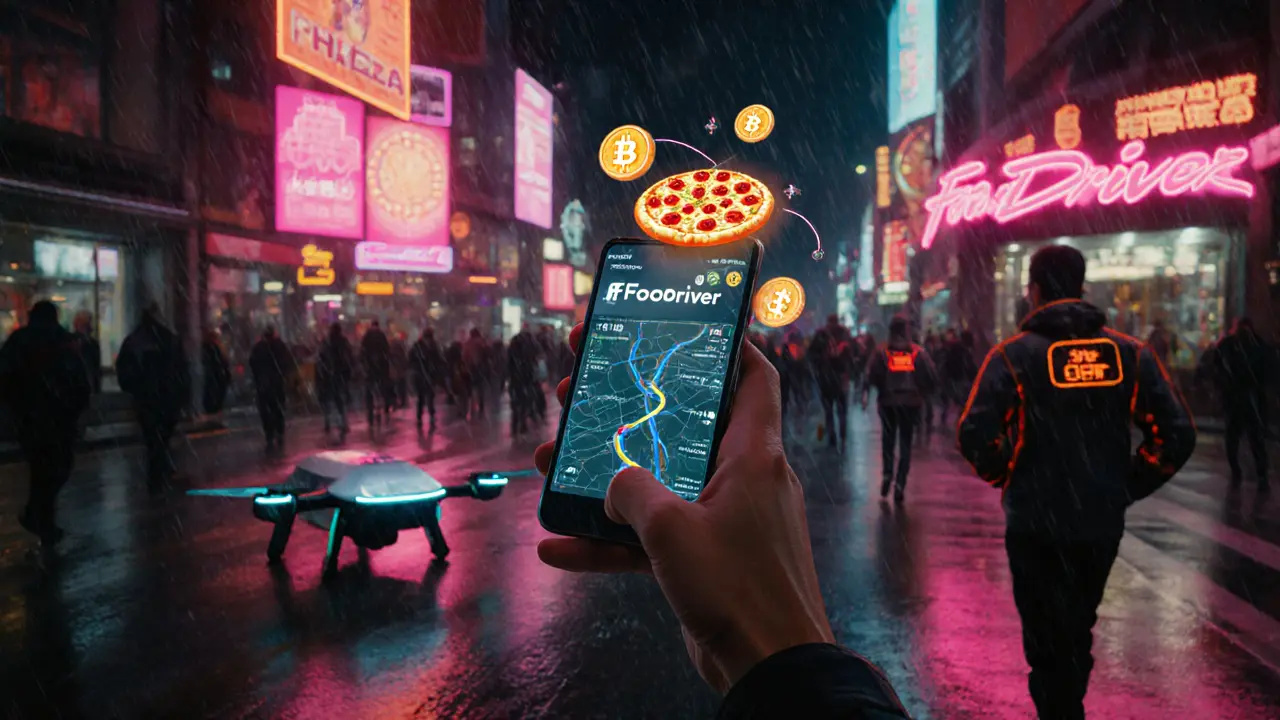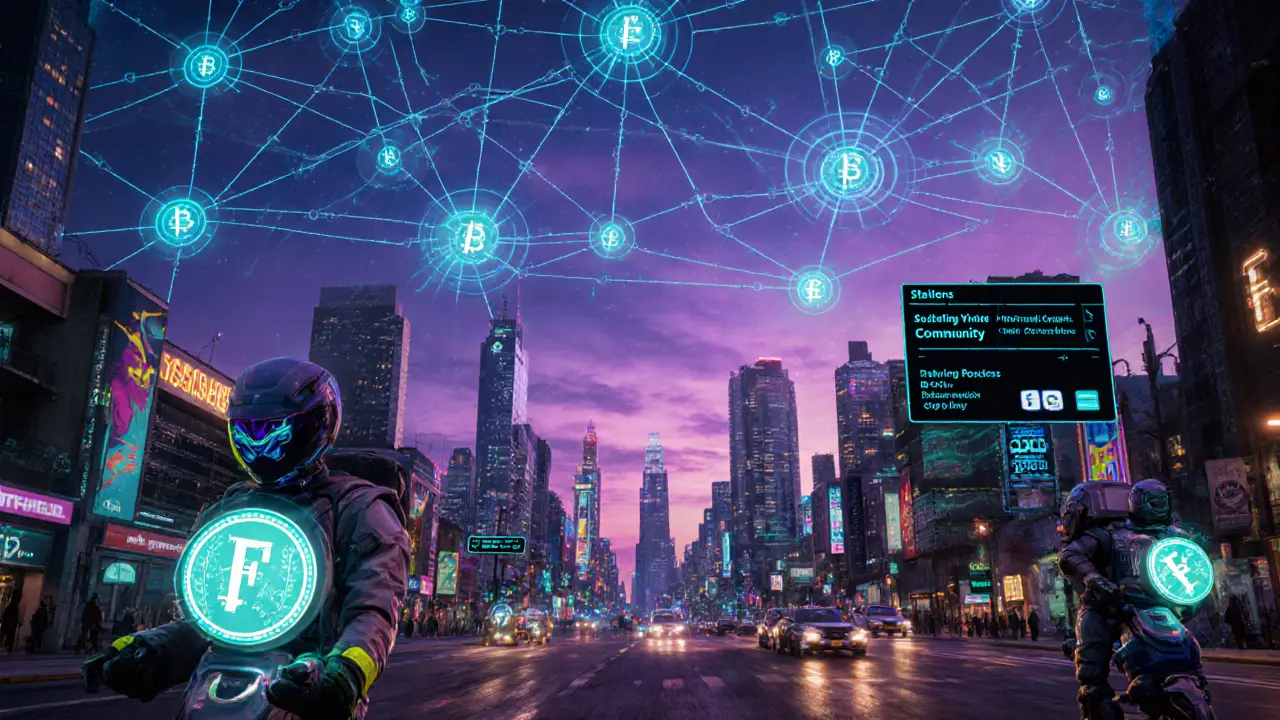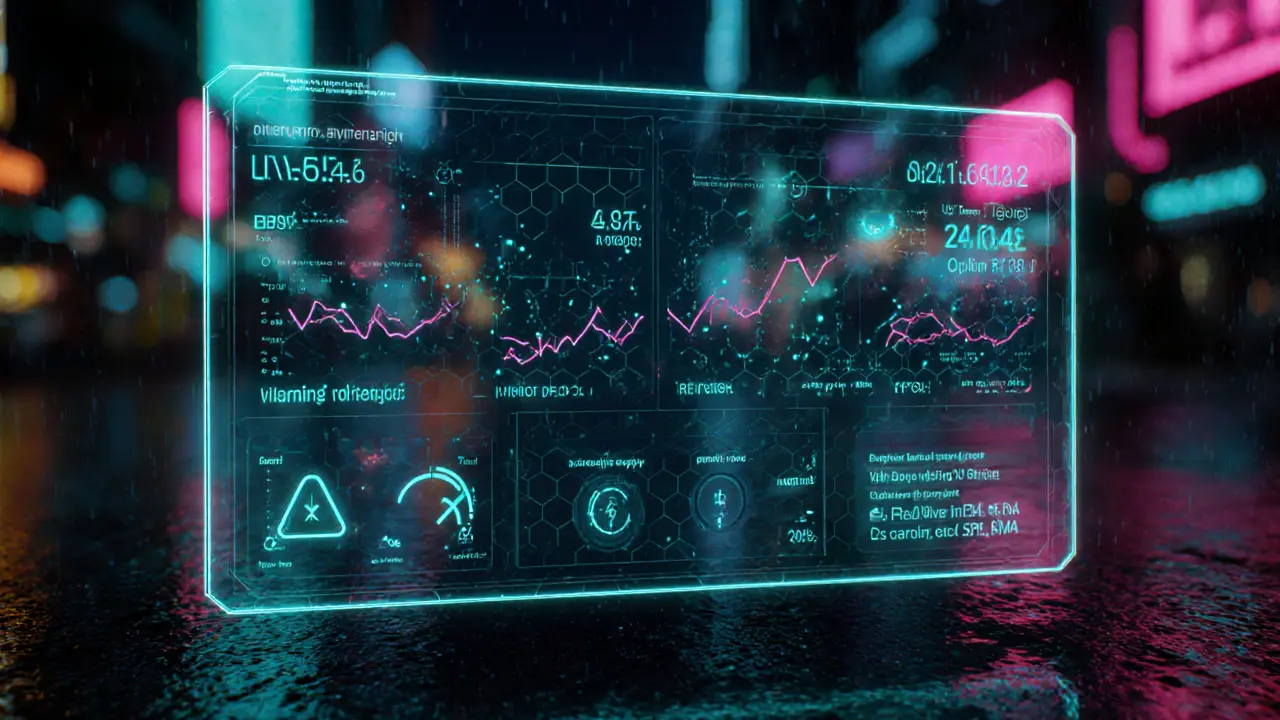FooDriver (FDC) Token Calculator
Current FDC Token Metrics
Token Value Calculator
Calculate the USD value of your FDC holdings based on current market price.
About FooDriver (FDC)
FooDriver (FDC) is an ERC-20 token built on the Polygon network. It powers a hybrid Web2/Web3 delivery dApp, enabling transparent transactions and gamified rewards for users.
With a maximum supply of 2 billion tokens and current market capitalization between $1.8 million and $118 million, FDC provides utility through payments, staking, and incentives within the FooDriver ecosystem.
FooDriver (FDC) is a cryptocurrency token that powers the world’s first hybrid Web2/Web3 delivery dApp, aiming to blend traditional shopping with blockchain‑based transparency and rewards. Built as an ERC‑20 token on the Polygon network, FDC serves as the native medium of exchange for payments, staking, and gamified incentives within the FooDriver ecosystem.
Quick Take
- FooDriver is a decentralized delivery platform that uses the FDC crypto coin for all transactions.
- FDC is an ERC‑20 token on Polygon with a max supply of 2billion.
- Current price hovers around $0.06 USD; market cap varies between $1.8M and $118M.
- Utility includes buying goods, paying delivery fees, staking, and earning through gamified challenges.
- Roadmap targets expanded gaming features, global restaurant partnerships, and listings on exchanges like LBank, MEXC and BingX.
What Is FooDriver?
At its core, FooDriver tries to solve the friction in food‑delivery and e‑commerce by moving the transaction layer onto a blockchain. Instead of a centralized company taking a cut, the platform distributes fees to participants-customers, couriers, and merchants-via the FDC token. The hybrid model means users can still order through a familiar app‑like UI while the back‑end processes payments and reputation scoring on smart contracts.
Key players in the ecosystem include:
- FooDriverRegistry - a smart contract that records roles (merchant, driver, consumer) and permissions.
- FooDriverToken (FDC) - the native ERC‑20 token for value transfer.
- Gaming modules that reward virtual deliveries with extra FDC.
Technical Foundations
FDC follows the ERC‑20 standard, which guarantees compatibility with most wallets and DeFi services. Deploying on Polygon reduces transaction fees dramatically-often under $0.001-compared with Ethereum mainnet, making micro‑payments for food orders feasible.
The token contract integrates with the FooDriverRegistry to enforce role‑based access. When a driver completes a delivery, a smart contract automatically releases a pre‑determined amount of FDC to the driver’s address, while the merchant receives their share. All events are publicly verifiable through Polygon block explorers.
Tokenomics at a Glance
| Metric | Value |
|---|---|
| Maximum Supply | 2billion FDC |
| Current Circulating Supply | ≈1.6billion FDC |
| Current Price | $0.06USD (≈$0.061‑$0.064 range) |
| Market Capitalisation | $1.8M - $118M (varies by exchange) |
| 24‑Hour Volume | $276k - $445k |
| Exchange Listings | LBank, MEXC, BingX (planned), Bitget (trading pairs) |

How Does FooDriver Differ From Traditional Delivery Platforms?
| Feature | FooDriver (FDC) | UberEats | DoorDash |
|---|---|---|---|
| Payment Model | Crypto (FDC) + fiat bridge | Credit/Debit, PayPal | Credit/Debit, Apple Pay |
| Fee Structure | Smart‑contract fees, driver rewards in FDC | Platform commission (≈30%) | Platform commission (≈28%) |
| Transparency | On‑chain transaction logs | Proprietary data | Proprietary data |
| Incentives | Earn FDC via gamified deliveries | Promotions, loyalty points | Promotions, DashPass rewards |
| Scalability | Polygon low‑cost, can handle high TPS | Central servers, occasional outages | Central servers, occasional outages |
By turning the payment layer into a public ledger, FooDriver promises lower hidden fees and real‑time auditability-two pain points that have long plagued ride‑share food delivery services.
Getting Started: Acquiring and Using FDC
- Purchase on Exchanges: FDC trades on Bitget, LBank, and upcoming listings on MEXC. Create an account, complete KYC (if required), and place a market or limit order.
- Transfer to a Wallet: Since FDC is ERC‑20 on Polygon, any Polygon‑compatible wallet (MetaMask, Trust Wallet, Coinbase Wallet) will accept it. Use the contract address from the official FooDriver site to avoid scams.
- Earn via Programs: FooDriver runs “Learn2Earn” tutorials and “Assist2Earn” challenges where users complete short tasks and receive FDC airdrops.
- Spend Inside the App: When ordering food, select the FDC payment option. The app converts the amount to the exact token quantity needed, then a smart contract locks the payment until delivery confirmation.
- Stake or Lend: Platforms like Bitget Earn let you lock FDC for a fixed period and earn up to 8% APY, providing passive income while you wait for the next delivery.
Roadmap and Future Prospects
The FooDriver team outlined a multi‑phase plan:
- Phase1 (Q12024): Core delivery dApp launch, basic token functionality, first restaurant partners.
- Phase2 (2025): Introduction of advanced gaming modules, localized interfaces for Asian and European markets, and deeper DeFi integrations.
- Phase3 (2026+): Full marketplace for retail goods, cross‑chain bridges to enable payments in other ecosystems, and strategic partnerships with major food‑service chains.
Success hinges on two big challenges: gaining real‑world restaurant adoption and convincing couriers that crypto rewards are as tangible as fiat wages. Regulatory uncertainty around crypto payments in commerce also looms, especially in regions with strict AML/KYC rules.
Risks and Considerations
Like any smaller crypto project, FDC carries specific risks:
- Market Liquidity: Trading volumes are modest; large sell orders can impact price sharply.
- Adoption Gap: Without a critical mass of merchants, the token’s utility stays limited to speculation.
- Regulatory Landscape: Some jurisdictions may restrict crypto payments for consumer goods, forcing the platform to fallback to fiat.
- Technical Scaling: While Polygon offers low fees now, massive user growth could stress the network unless Layer‑2 solutions are adopted.
Potential investors should weigh these factors against the upside of early entry into a niche that blends e‑commerce, logistics, and blockchain.
Community and Resources
FooDriver maintains active channels on Twitter (@FooDriver_dApp) and Telegram (FooDriver_Global). Regular AMA sessions discuss roadmap updates and answer user questions. For on‑chain data, Polygon explorers such as Polygonscan list the FooDriverToken contract and enable transaction tracing.

Frequently Asked Questions
What can I buy with FDC?
Within the FooDriver app you can pay for meals, grocery items, and delivery fees. Some partner retailers also accept FDC directly for in‑store purchases.
Is FDC the same as other ERC‑20 tokens?
Technically it follows the ERC‑20 standard, so it works with any wallet that supports Ethereum‑compatible tokens. Its unique value comes from the FooDriver ecosystem, not from the token code itself.
How do I earn FDC without buying it?
FooDriver runs “Learn2Earn” tutorials, “Assist2Earn” tasks, and seasonal airdrops. Completing virtual deliveries in the game also yields token rewards.
Can I stake FDC for passive income?
Yes. Platforms like Bitget Earn offer fixed‑term staking with APY rates ranging from 5% to 8% depending on lock‑up period and market conditions.
What are the main competitors to FooDriver?
Traditional services like UberEats and DoorDash dominate the market, but they lack blockchain‑based transparency. Other crypto‑driven delivery pilots exist, yet none combine a full‑stack dApp with a native token the way FooDriver does.
Is FooDriver regulated?
Regulation varies by country. The team claims compliance with KYC/AML standards on listed exchanges, but the dApp itself currently operates in a regulatory gray area.
FooDriver aims to rewrite the rules of food delivery by putting value directly into the hands of users through the FDC crypto coin. Whether you’re a crypto enthusiast looking for a new token, a delivery driver curious about earning in crypto, or a restaurateur exploring lower fees, understanding the token’s mechanics, market data, and roadmap is crucial before diving in.

Jacob Anderson
April 11, 2025 AT 16:42Oh great, another crypto promising to fix delivery fees while charging you a fraction of a cent per transaction.
Waynne Kilian
April 23, 2025 AT 11:20Sure, the idea sounds intriguing, but let’s not forget that every new token brings its own set of challenges.
On one hand, the transparency of on‑chain payments could democratise the delivery space.
On the other, the volatility of a token like FDC might scare off everyday users who just want a hot pizza.
It’s definitely a philosophical shift – moving from trust in a corporation to trust in code.
Just a heads‑up, the roadmap looks ambitious, but execution will be the true test.
VICKIE MALBRUE
May 6, 2025 AT 04:53FDC looks promising for anyone who loves crypto and quick bites. The low fees on Polygon are a real plus. If you get in early, the upside could be sweet. Keep an eye on the partnerships for real world use.
Lindsay Miller
May 17, 2025 AT 18:40It’s cool how the token aims to help both drivers and customers. Simple tools make it easier for new users. The idea of staking for passive income is also nice. I hope the app stays user‑friendly.
Katrinka Scribner
May 23, 2025 AT 13:33Totally love the vibe! 😊 The emojis kinda make the whole thing feel more human. I think the typo‑prone bits are just because it’s early stage 😅. Keep pushing, FDC fam! 🚀
april harper
June 4, 2025 AT 03:20The tokenomics of FooDriver (FDC) read like a textbook on speculative optimism.
First, the maximum supply of two billion sets a hard ceiling, yet the circulating supply already hovers near eighty percent of that, which raises the question of true scarcity.
Second, the current market cap swings wildly between $1.8M and $118M, a range that suggests either a hidden liquidity problem or wildly differing valuation models across exchanges.
Third, the price per token dances around $0.06, a figure that seems trivial until you multiply it by the millions of tokens that could be issued to drivers and merchants.
Fourth, relying on Polygon for transaction throughput is smart for cost, but the network’s long‑term scalability remains unproven at massive adoption levels.
Fifth, the reward mechanisms – Learn2Earn, Assist2Earn, and gamified deliveries – sound engaging, yet they may inflate token supply if not carefully calibrated.
Sixth, staking offers up to 8% APY, which is attractive but could create a yield‑chasing crowd that cares less about the delivery utility and more about financial returns.
Seventh, the roadmap’s phases promise expansion into retail and cross‑chain bridges, but each new feature brings regulatory scrutiny that could stall progress.
Eighth, the competitive landscape is crowded: traditional giants like UberEats dominate market share, and crypto‑driven pilots are still experimental.
Ninth, liquidity on listed exchanges such as LBank, MEXC, and Bitget is modest; any large sell‑off could devastate prices, harming both users and drivers.
Tenth, the governance model is vague – who decides token distribution, fee structures, or future upgrades?
Eleventh, the dependence on a stable fiat‑crypto bridge adds another layer of risk, especially in jurisdictions tightening AML/KYC rules.
Twelfth, the community’s enthusiasm is palpable, but hype can mask underlying technical debt.
Thirteenth, the token’s utility hinges on real‑world restaurant adoption – without that, FDC may remain a speculative asset.
Fourteenth, the smart contract code, while ERC‑20, must be audited thoroughly to avoid exploits that could drain funds.
Fifteenth, the legal standing of crypto payments for everyday goods is still a gray area in many countries, potentially limiting scalability.
In summary, FooDriver presents an ambitious blend of logistics and blockchain, but the path forward is riddled with economic, technical, and regulatory challenges that investors must weigh carefully.
Carl Robertson
June 15, 2025 AT 17:06Honestly, the drama around FDC feels manufactured. The team throws buzzwords like "gamified" and "low‑fee" without showing real numbers.
Sure, Polygon fees are cheap, but can they sustain millions of micro‑transactions per day?
The liquidity on the exchanges is thin, and any whale move could tank the price.
From an analyst’s view, the token’s utility is still theoretical – we haven’t seen a single merchant chain adopt it at scale.
Still, the roadmap is flashy, and the community hype is real, so I’m watching for a breakout, but with a healthy dose of skepticism.
Kate Roberge
June 27, 2025 AT 06:53Look, I get the drama, but the whole thing is just another crypto hype train. Everyone’s talking about “decentralised delivery” like it’s the next big thing, yet the actual on‑ground adoption is practically zero.
Why should a driver care about a token that could lose half its value overnight?
If you ask me, the real value is in the data they collect, not the token itself.
So, keep your eyes open and don’t fall for the glossy marketing.
Oreoluwa Towoju
July 8, 2025 AT 20:40FDC could be a useful tool if it truly reaches restaurants and drivers. The concept of transparent payments is solid, and the low fees on Polygon are appealing. Let’s hope the team backs up the promises with real partnerships.
Ben Dwyer
July 20, 2025 AT 10:26Focus on the fundamentals: secure smart contracts, real merchant onboarding, and sustainable token economics. Those are the pillars that will determine whether FDC thrives or fades.
Naomi Snelling
August 1, 2025 AT 00:13Just remember, every time you trust a new crypto platform, you’re handing over data to another entity that could be monitored by shadowy forces. The regulatory landscape is shifting, and some governments already treat crypto payments as illicit. Stay alert and consider the bigger picture beyond the hype.